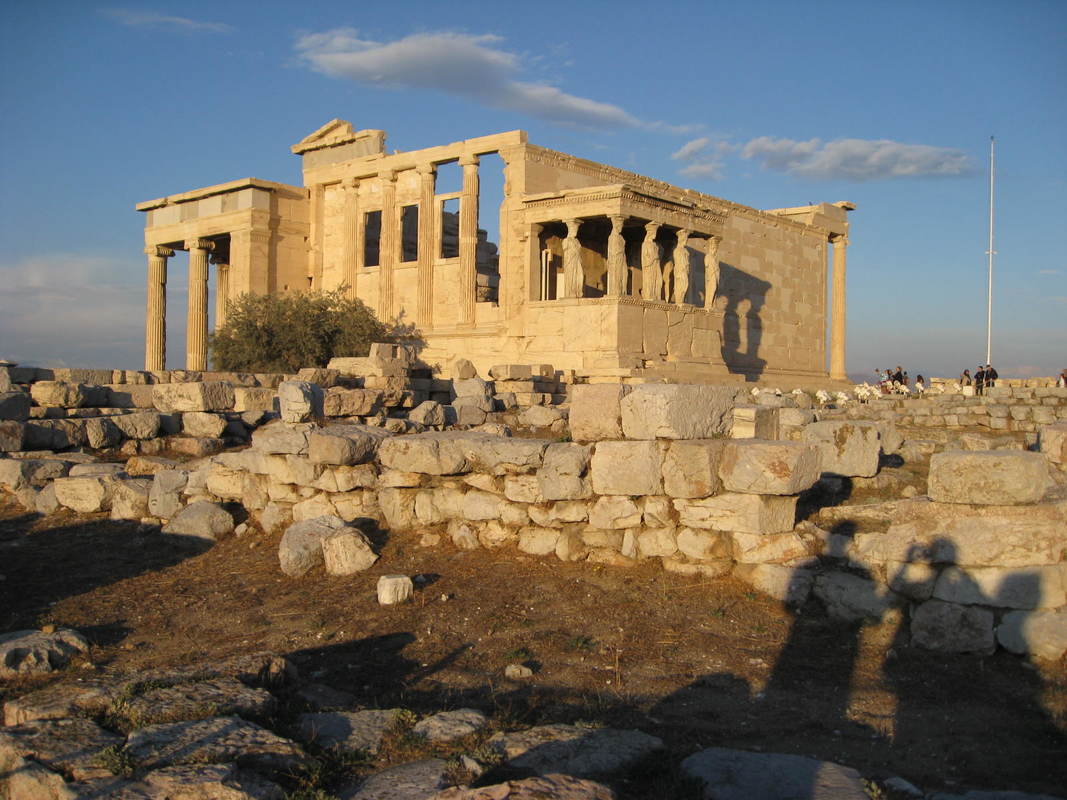|
Gazing up at the Acropolis of Athens or tracing Plato’s footsteps across the Agora a few weeks ago evoked awe. Much of the Anglo-European heritage of my upbringing can be traced back to ancient Greece. Here’s where it all began—depending what you mean by “it.” Civilization. Surely the ancients didn’t foresee the traffic jams of modern Athens when they associated civic virtue with cities. While cities arose independently from the Aztecs to the Indus Valley, many in Europe originated with the Greeks and their cultural offspring, the Romans. Democracy. Though lively political discussion enlivened our Greek adventure, the role of ancient Athens as the source of modern democracy is overrated. Medieval parliaments emerged from royal councils. Cities and colonies drew voting rights from royal charters, trade associations, and joint-stock companies. Founders of the United States looked in part to the example of the Iroquois Confederacy. Culture. You can’t look at the Parthenon and miss the Greek impact on modern architecture. Comedy and tragedy still play in ancient stone theaters. Greeks gave us the Pythagorean theorem, the Hippocratic Oath, Aristotelian logic, and Euclidean geometry. Alphabets, created for business records and law codes, flowered in Greece into poetry, epic, drama, and philosophy. Only the ancient Hebrews influenced Western culture to a comparable degree, and their influence spread in Greek translation. For the cultural heritage I grew up with, Greece is where it all began.
3 Comments
My house is never so clean as when there’s some major big desk project I want to avoid. The project will get done by its due date – decades of freelancing instill that habit – and meanwhile whole closets get organized if I’m procrastinating really hard.
Stanford philosopher John Perry suggests that procrastinators quit trying to reform or clear their calendars. Instead, draw up a ranked list of things you have to do, with the most urgent at the top. The top one won’t get done, but you’ll throw yourself into other worthwhile things to avoid it. Eventually something even more urgent will come up, and you’ll turn to the previous top-ranked priority as a way to procrastinate on the new one. “At this point, the observant reader may feel that structured procrastination requires a certain amount of self-deception, since one is, in effect, constantly perpetrating a pyramid scheme on oneself,” Perry writes. For his answer to this and other details of his method, click here to read his entertaining and instructive article. Original historical research enthralls few besides professional historians, with one huge exception: family history. Genealogy is said to be the second most popular hobby in the United States, after gardening.
The desire to trace ancestry goes back millennia. Biblical lists detail generations of who begat whom. Family history has taken on new life with the expansion of retirement leisure; the computerization of vital records; the availability of DNA analysis; and disconnection from close-knit communities of kin. Like any passionate research, genealogy offers the adventure of discovery. It’s exciting to dig out pieces of a puzzle and assemble them into an ever-growing story or picture. History provides an opening into distant times and cultures. Family history has the added draw of personal connection. It helps answer "Who am I?" and "Where do I fit in?" Serious genealogists may trace every branch with equal vigor, but most of us pick and choose. Of my sixteen great-great-grandparents, only one was born a Gibbard, but that's who I mean when I say I’m descended from English bakers. Why take pride or identify more with one than another? Professor Henry Louis Gates of PBS’s Finding Your Roots says descendants of slaveholders needn’t feel ashamed; guilt isn’t hereditary. By the same token, while learning about our ancestors can help us understand ourselves, we can’t justly claim credit for their achievements. Airplane pilots in the 1930s who went up without instruments or a flight plan were said to fly by the seat of their pants. The term still means making it up as you go along, whether by choice or because you have no idea what you’re doing. Some love the freedom and unpredictability. Others prefer every detail mapped out in advance.
Which describes you? Do you prepare a shopping list or wait to see what catches your eye? Make motel reservations before a car trip or decide daily where to stop for the night? Among authors of fiction, “plotters” outline their story before drafting the first paragraph, while “pantsers” write by the seat of their pants. Plotting and pantsing aren’t a dichotomy but poles of a continuum. Pilots today make continual midcourse corrections to keep their planes aimed toward the destination. I begin a day or project with a plan. Then I hold to the details lightly, adjusting along the way. |
AuthorI'm a historian who writes novels and literary nonfiction. My home base is Madison, Wisconsin. Archives
July 2024
|

 RSS Feed
RSS Feed